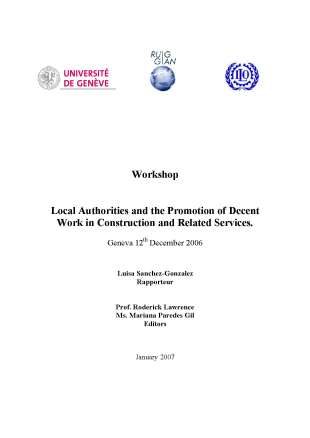Promoting Decent Work in Construction and Related Services: the Key Role of Local Authorities
Annual Call for Projects 2005
Summary
Although local authorities in developing countries often play a significant role in fostering construction projects and related activities, information and knowledge about their potential for promoting decent work (including the creation of employment) in such a sector through good policy-making and strategic allocation of public resources is still poorly understood. Publications on decent work have not acknowledged the potential role of local authorities but focused on the private sector. In addition, many development and aid agencies have not explored the full potential of such an approach despite the debate launched by the United Nations Habitat II Conference held in Istanbul in 1996. While a number of local authorities have been pro-active in implementing best practices related to decent work, many others still do not have the knowledge necessary to do so. This project aims at providing knowledge to reduce the gap between the two sets of local authorities.
The project will not only analyse how the construction industry could make an important contribution (in both the formal and informal sectors) to employment generation and the quality of work, but will also examine in what way local authorities could play an important role in such a process. Therefore, this project explicitly promotes the social and economic dimensions of sustainable development at the local level. Three case studies will be undertaken: in Bulawayo (Zimbabwe), Dar-es-Salaam (Tanzania) and Santo André (Brazil).
This interdisciplinary research project will produce a website and a monograph. These outcomes will contribute to clarifying a domain in which the literature is fragmented and composed of a large mass of so-called ?grey literature?. The research findings will also be presented as a manual, including a set of criteria and guidelines, to facilitate its practical use. The manual will include policy-relevant recommendations for decision-makers (local, national, donors, international organisations, NGOs). Alternative and "user-friendly" modes of dissemination, such as a video, will also be considered.
Finally, in addition to creating new knowledge, the project will organise a network through which all the findings and recommendations will be disseminated to local stakeholders and their partners.
Objectives of the project
- To analyse through case-studies the feasibility of promoting decent work (including creating employment) in the construction sector by the initiative of local authorities;
- To produce a set of guidelines (on the role of local authorities in promoting decent work) that apply knowledge in practice;
- To anchor the aforementioned product of the research project in networks of local authorities in order to generate and sustain the implementation of good practices.
Methodology:
The project methodology combines quantitative and qualitative approaches. An important aim and contribution of the project is to define and validate a set of criteria to evaluate the capacity of local authorities to promote decent work in the construction sector. In order to achieve this goal, it is necessary to define and evaluate criteria about decent work, about the construction sector (and related services), and about the policies and programmes of the local authorities in each city selected as a case study.
This project consists of three phases. Phase 1 entails a synthesis and critique of recent contributions concerning the target subject, stemming from a review of the literature. It also includes the definition of criteria and sources of information to assess decent work in the construction sector in precise localities. Phase 2 involves the completion of case studies by field research in selected municipalities using the criteria and methodology validated in phase 1. The case studies will evaluate the strengths and weaknesses of policies and programmes for the promotion of decent work in each municipality. This phase will validate the proposed criteria and methods which only then could be reapplied in other localities. Phase 3 includes the documentation and dissemination of a set of guidelines, a product of this project which could then be reapplied. The project will benefit from international forums and the existing networks of all partners to disseminate the results.
The Partner Institutions:
This project is founded on the complementary capacities of staff at the International Labour Office (ILO) and the University of Geneva (Unige). The products of the project will be widely disseminated with the assistance of two associate partners, the Decentralised Co-operation Programme of the United Nations Institute for Training and Research and the project of the United Nations Volunteers and United Nations Development Programme entitled "Support to Municipal International Solidarity".
The grant provided by the GIAN for this project totals SFr 209,000
Project Team
Dr. Edmundo Werna , Coordinator, Programme d'action intégré dans le secteur de la construction , Construction , Sectoral Activities (SECTOR) , Social Dialogue Sector (DIALOGUE) , International Labour Organisation (ILO) .
Prof. Yves Flückiger , Principal Member, Department of Political Economy , Faculty of Economic and Social Sciences (SES) , University of Geneva (Unige) .
Prof. Roderick J. Lawrence , Principal Member, University Centre of Human Ecology and Environmental Sciences (CUEH) , University of Geneva (Unige) .
Ms Mariana Paredes Gil , Principal Member, University Centre of Human Ecology and Environmental Sciences (CUEH) , University of Geneva (Unige) .
Mr Cédric Lambert , Associated Member, University Centre of Human Ecology and Environmental Sciences (CUEH) , University of Geneva (Unige) .
Related Links
Related Conferences
ILO Workshop on Local Authorities and the Promotion of Decent Work in Construction and Related Services – 12 December 2006
This workshop aims to inform how local authorities can promote employment and decent work in construction projects. It...
> more
Research Output
|
Workshop on Local Authorities and the Promotion of Decent Work in Construction and Related Services
(available in English only) > more |
|
Promoting Decent Work in Construction and Related Services: The Key Role of Local Authorities
(available in English only) > more |

